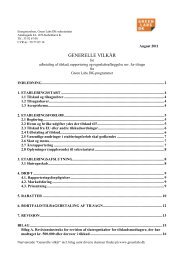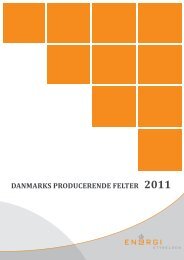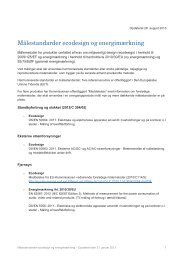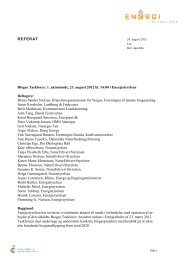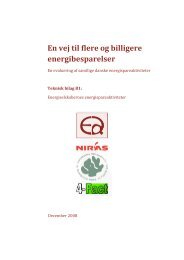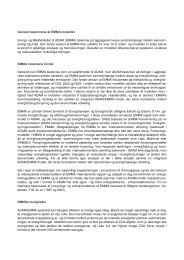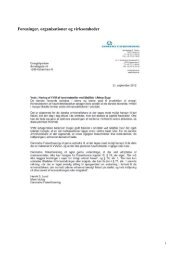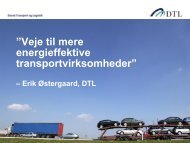Energy Strategy 2050 – from coal, oil and gas
Energy Strategy 2050 – from coal, oil and gas
Energy Strategy 2050 – from coal, oil and gas
Create successful ePaper yourself
Turn your PDF publications into a flip-book with our unique Google optimized e-Paper software.
A greater use of biomass<br />
Background The government will<br />
Biomass has the potential to replace large amounts of<br />
<strong>coal</strong> <strong>and</strong> natural <strong>gas</strong> cost-effectively in the relatively short<br />
term. In the long term, conversion <strong>from</strong> fossil fuels to<br />
renewable energy outside Denmark can lead to pressure<br />
on biomass resources <strong>and</strong> thus rising prices, <strong>and</strong> possible<br />
challenges to security of supply. On the other h<strong>and</strong>,<br />
it must be anticipated that the technologies used in the<br />
production of biomass <strong>and</strong> biofuels will undergo developments<br />
which can lower the price of energy produced<br />
<strong>from</strong> biomass.<br />
At present, the majority of large-scale power plants in<br />
Denmark can use biomass for part of their production,<br />
while many natural <strong>gas</strong> fired small-scale plants have<br />
long had an ambition to convert to biomass-based heat<br />
production.<br />
The largest Danish cities have ambitious climate plans<br />
<strong>and</strong> have expressed their wish to make heating <strong>from</strong><br />
large-scale plants carbon-neutral within the next 20<br />
years. The government will therefore allow for a greater<br />
degree of freedom of contract between producers <strong>and</strong><br />
buyers of district heating in the larger cities. Furthermore,<br />
the government will remove the restrictions on the free<br />
choice of fuel for smaller plants outside the ETS sector,<br />
so that these plants can replace natural <strong>gas</strong> with<br />
biomass.<br />
By removing these restrictions <strong>and</strong> introducing the free<br />
choice of fuel, the government can also contribute to<br />
lower heating prices in the district heating areas involved.<br />
This will especially benefit the open-field plants, some<br />
of which today charge very high prices. The free choice<br />
of fuel will also make for greater use of local biomass<br />
resources by smaller plants, for instance straw <strong>and</strong> chippings,<br />
to the extent that this is profitable.<br />
• Change the provisions of the Danish Heat Supply<br />
Act, so that the settlement of prices on heating<br />
produced <strong>from</strong> biomass at large-scale CHP plants<br />
will no longer be limited by non-profit regulation. In<br />
this way, producers <strong>and</strong> buyers of CHP can agree<br />
on a price by which they share the tax benefits of the<br />
transition to biomass<br />
• Allow plants of up to 20MW a free choice of fuel,<br />
which will enable a number of natural <strong>gas</strong> fired plants<br />
to convert to production based on biomass<br />
• Carry out an analysis of the use of biomass for<br />
energy-related purposes in Denmark. The analysis<br />
will focus on whether the right framework conditions<br />
for efficient <strong>and</strong> environmentally sustainable use of<br />
biomass resources are in place. The analysis will<br />
prepare a long-term strategy for the use of biomass<br />
resources for energy purposes <strong>and</strong> will draw on<br />
experience <strong>from</strong> other counties<br />
<strong>Energy</strong> <strong>Strategy</strong> <strong>2050</strong> <strong>–</strong> <strong>from</strong> <strong>coal</strong>, <strong>oil</strong> <strong>and</strong> <strong>gas</strong> to green energy.<br />
33



